#Cherokee Creek
Text
Tribal Names
I don’t think many people, even some native people, are aware that the legal names of many tribes are actually not from the tribe.
Often the names came about because colonizers would ask one tribe "hey, what do you call those people over there?". then they would assign the name given to that tribe. so often the names were descriptions from unrelated tribes, or in more extreme cases, insults.
The Muscogee tribe got pretty lucky since the legal name was "creek" and it came from a different tribe going "oh, those are the people near the creek". which, is accurate enough, most creek settlements were placed along creeks. a famous one that is related to the Muscogee is the name "Cherokee". "Cherokee" is a Muscogee word meaning something along the lines of "people who don’t speak our language". Even this is pretty light compared to some names. some official tribal names translate to phrases like "dog eaters" or "lazy people".
This is why it’s not uncommon for tribes to start using older names. Muscogee comes from the term for our people "Mvskoke", and the tribe has made efforts to distance itself from the name "Creek". Although it is likely still the name you’ll hear most often.
#muscogee#mvskoke#native blogs#native american#indigenous blog#indigenous#native girls#indigenous history#muskogee#cherokee#oklahoma#native americans#tribal names#tribes#north american history#creek tribe
2K notes
·
View notes
Text
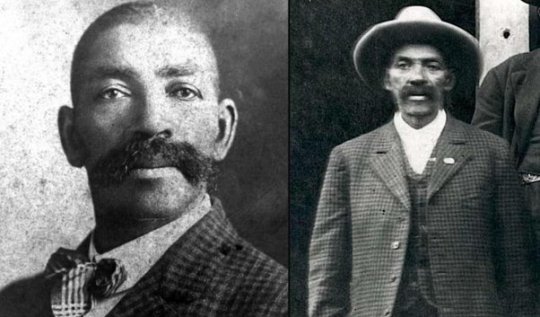
BASS REEVES. 1838-1910. U.S. Deputy Marshall.
Reeves was born into slavery then had a fight with his slave owner and ran and lived with the Cherokee and Creek people learning many native languages.
He became a free man under the 13th Amendment and later enlisted in Law Enforcement. He became the first African U.S. Deputy Marshall west of the Mississippi with full authority over the states of Texas, Oklahoma and Arkansas.
During his 32 years in office he personally went on to arrest over 3,000 dangerous criminals, shooting 14 in the process of arrest.
He was and STILL is the most prolific Law Enforcement Officer ever in the U.S.A.
He carried a Winchester Rifle and two Cal. 45 Colts and rode a snow white horse. Quite a few experts believe that he was the inspiration for ' The Lone Ranger' stories.
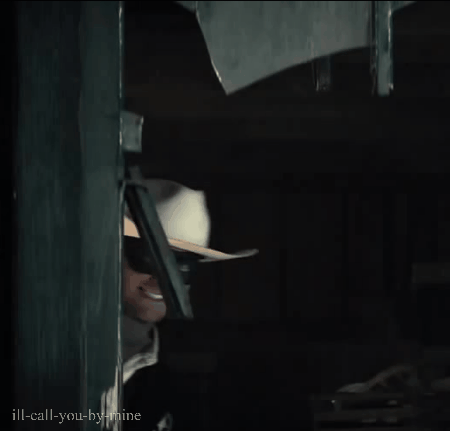
#bass reeves#us deputy marshall#cherokee#creek#texas#oklahoma#lone ranger#winchester rifle#kemetic dreams#african#law enforcement officer#usa#.45 colt#13th amendment
337 notes
·
View notes
Text
Working on a lil Oscar redesign

Big ears even bigger heart/imagination. Love the little farmer boy! >.<
#rwby#rwby art#rwby fanart#rwby headcanon#(?? maybe??)#rwby redesign#rwby rewrite#rwby oscar pine#rwby oscar#oscar pine#he’s just a funky lad#gosh dang it velvet#I just kinda crawled out of nowhere#freshman year of college is kicking my ASS#He’s cute and his design gives off more of his personality/the culture in this#Rwby never seems to have much culture#like different languages or cultural differences between areas so I wanna change that#like… Native American culture because I’m a Creek/Cherokee native
16 notes
·
View notes
Text
Flag of the Cherokee Confederacy
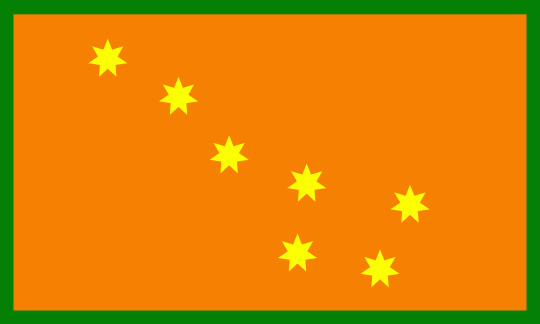
This is the flag of the Cherokee Confederacy. It comes from a world where the Spanish Armada successfully conquered England in 1588. While England did eventually regain its independence, the Spanish conquest severely stunted England’s growth as a world power, and lead to greater political instability. As a result, England never became a demographic juggernaut during the colonization of North America. The lands that would have become the Thirteen Colonies are a patchwork of nations and colonies founded by numerous European nations. There are also several independent indigenous nations, such as the Cherokee Confederacy.
The Cherokee Confederacy also includes the Muskogee, Chickasaw, and Choctaw tribes. The Cherokee, as reflected by the name, were the founding tribe of the confederacy. The Cherokee Confederacy was one of the first indigenous nations of North America to implement westernization and industrialization programs. Today, most Cherokee dress in European-style clothing, but do wear traditional clothing on special occasions. Like most southern nations in eastern North America, the Cherokee historically practiced slavery. Slavery was formally abolished in 1885 as part of the modernization efforts. Racial divides and tensions still remain, but the Cherokee government has, in recent years, implement programs to help blacks integrate into Cherokee society.
The Cherokee legislature, known as the Tribal Council, is organized into a semi-parliamentary democracy, with a prime minister as the Head of Government, and a president as Head of State. The Cherokee Tribal Council is closer in style to the French National Assmbly, rather than to the English Parliament. The Cherokee Confederacy is centered around what would be western North Carolina, Tennessee, and the northern bits of Alabama, Mississippi, and Georgia. The indigenous republics of North America, being sovereign nations, did not suffer an equivalent of the Indian Removal Act.
Historically, the Cherokee Confederacy has been rivals with the Haudenosaunee Federation. However, in recent times the two nations have been putting their rivalries behind them. In terms of good relations, the Cherokee Confederacy has historically been an ally of New Neatherlands, which in located in Virginia. The various nations of North America have formed a European Union-style economic union, and there are hopes that this will eventually leads to a federation. There is a general spirit of good will and optimism. That said, North America still has a ways to go before its nation states become united.
The flag contains seven gold stars in the shape of the Big Dipper, or Ursa Major, on an orange field with a green border. Ursa Major is an important constellation to several tribes within the Cherokee Confederacy. It also symbolizes how the same night sky shine over the entire Cherokee Confederacy. Blue would seem a natural color choice, but the Cherokee picked orange instead. There is some debate about why this is. Popular belief says that it symbolizes the Cherokee Confederacy’s ties to New Netherlands. However, the Cherokee actually picked orange to contrast with the blue flags several other North American nations use. The green border is to offset the orange.
Link to the original flag on my blog: https://drakoniandgriffalco.blogspot.com/2022/05/flag-of-cherokee-confederacy.html?m=1
#alternate history#alternate history flag#alternate history flags#flag#flags#vexillology#Cherokee#Cherokee Confederacy#Creek#muskogee#chickasaw#Five Civilized Tribes#Choctaw#indigenous people#Native Americans#Native American#indigenous#north america#United States#America#USA#United States of America#alt history
37 notes
·
View notes
Text
Americanized (Wattpad | Ao3)
Part Two Here
Based on @walkingtalkingcountries's Headcanons for Oklahoma. These aren't mine, but I loved them so much I just had to write a oneshot for him on them. The headcanon is, in his words:
"Basically, Oklahoma was given to the Native tribes that were forced out of their homes in the trail of tears when he was a baby, and the tribes were told he was theirs to keep. While they were suffering substantially and certainly not happy, they tried to raise him the best they could, though it was a struggle. America infrequently checked on who he called 'Indian Territory', but eventually he started to become set on claiming his lands for himself. So naturally, America took Oklahoma away from them and basically re-raised him to be more American. Nowadays, Oklahoma is nearly unrecognizable to the tribes that'd raised him"
Summer, 1900
“I miss Oklahoma,” Choctaw said as he walked with his fellow “civilized tribes” through Fort Gibson. They had agreed to meet here to discuss the dwindling contact from Oklahoma. They were worried and had just spoken for an hour, pouring over his letters to see if there was any cause for concern.
But they found nothing. And that was more worrying than something.
“So do I. I’m worried. What if America did something to him or banned him from talking to us? You’ve heard about what they have been doing in those schools. What if the same things are happening to our son?” Chickasaw said, worry clear on her face.
“America sees him as his son, even though he abandoned him,” Cherokee said, as Creek patted her shoulder comfortingly, “and I don’t think he would do that.”
“But like you said, he abandoned Oklahoma. What if he did?” Seminole pointed out.
“Seminole. ᎰᏩᏧ. You aren’t helping anyone’s worry.” Cherokee said. Seminole groaned.
“Cherokee, we can’t trust America! When has he ever given us a reason to? He forced us off our lands; he took our son to ‘raise him properly.’ I don’t trust him with Okie’s safety, and you shouldn't either.” Seminole argued, making an excellent point that they probably all realized they were too nervous to voice.
“I know Sem-I-is that Okie?” Cherokee said, cutting off her statement and pointing further down the street. Choctaw looked to where she was pointing and nodded.
“That is him,” Chickasaw said, relief in her voice.
“OKLAHOMA! Hę̄r’s cē!” Creek yelled as they began rushing over. Choctaw saw Oklahoma’s head briefly turn to face them before turning away again and continuing down the street.
“Oklahoma, wait!” Choctaw said as a wide grin began to spread across his face. He put his hand on Oklahoma’s shoulder, and Oklahoma knocked it aside. Choctaw’s face changed to one of shock and confusion.
“Okie?” Seminole asked. Oklahoma turned to face them, and the first thing Choctaw noticed was how blank his face was. Oklahoma kept it neutral and expressionless. His eyes seemed distant and conflicted before they settled on resolute determination.
“What do you want?” He asked, his voice empty. His accent had changed, too. It sounded like a perfect American accent. It sounded like America’s.
Creek gave a small disbelieving laugh, “Okie, I know we haven’t seen you in almost a decade, but you don’t have to be so formal. We’re your family, after all!”
“No, you aren’t. I am not related to any Indians. My only family is Father and the other states.” Oklahoma said in the same blank tone. Choctaw felt as if someone had stabbed a knife in his heart.
What had America done to him?
“ᎨᏍᏗ ᏱᎪᎵᎢᎦ.” Cherokee said.
“I do not speak Indian,” Oklahoma said, looking at Cherokee. The knife in Choctaw’s heart twisted.
“That’s Cherokee, not Indian. Okie, you know that language. Cherokee taught you,” Choctaw said.
“I only know English and French. I don’t know any Indian tongues.” Oklahoma said. Choctaw felt sick. America had done something to their son. He warped him into a copy of himself, a copy of the same people who had put Oklahoma through so much strife.
“Yes, you do. We raised you with our languages, and we taught you them,” Seminole pleaded. Oklahoma barely spared him a glance.
“You did not raise me. Father told me about how you kidnapped me to use against him and raised me to be an Indian so that I would fight against him. Luckily, Father was able to save me and helped me realize what you did. So stop calling me nicknames. Those are reserved for family only.” Oklahoma said.
“But you are our son!” Choctaw insisted. Oklahoma’s neutral expression broke and changed to one of fury.
“I am not the son of savages.” He said. The knife buried itself deeper and deeper and kept twisting all the while.
He was so different now. What happened to Choctaw’s Okie, the one who would sit on his knee and ask for stories? The one who barely spoke any English after living with them for so long. The one who showed so much emotion in everything he did.
“Iki, iki!” Choctaw remembers Oklahoma, who was seven years old, saying as he approached Choctaw once, long ago, his hands clasped tightly around something.
“What is it, iso nakni?” Choctaw had asked. Oklahoma had smiled, showing his missing front tooth, and proudly stuck his hands out.
“I caught a frog! Look at it, Iki!” He babbled, gasping as the frog jumped out of his dirty hands. Tears had welled up in his eyes.
“I’m sorry, Iki!” He had cried. “I lost the frog.”
Choctaw had smiled warmly at him. “There will be other frogs. But if this one means so much to you, I will help you catch it again. How does that sound, Okie?”
Oklahoma said yes. Oklahoma was Choctaw’s son and his family.
But Oklahoma…he…
“What did America do to you?” Cherokee asked angrily. The blank expression returned.
“He simply taught me who I was supposed to be,” Oklahoma said.
“But this isn’t who you are! What did America do to make you this way? Did he hurt you?” Chickasaw asked.
“Father helped me so much. I will forever be in his debt. He helped me become an American, who I am supposed to be. Now, I have no reasons to talk to a group of Indians outside of politics, so unless you have something of that nature to discuss, I’ll be on my way.” Oklahoma said. They were silent, the shock rendering them speechless.
Oklahoma nodded, turned around, and began walking back down the road.
He didn’t even say goodbye.
Choctaw fell to his knees and began sobbing. America had stolen his son and turned him into a stranger. Choctaw shouldn't have let America take him. But he did. And now Oklahoma was gone.
His son was gone.
#countryhumans#statehumans#countryhumans america#oneshots by weird#statehumans oklahoma#countryhumans creek#countryhumans choctaw#countryhumans cherokee#countryhumans chickasaw#countryhumans seminole
2 notes
·
View notes
Photo
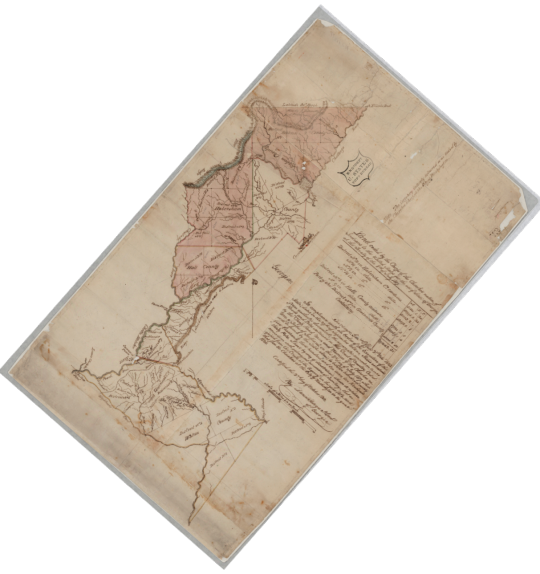
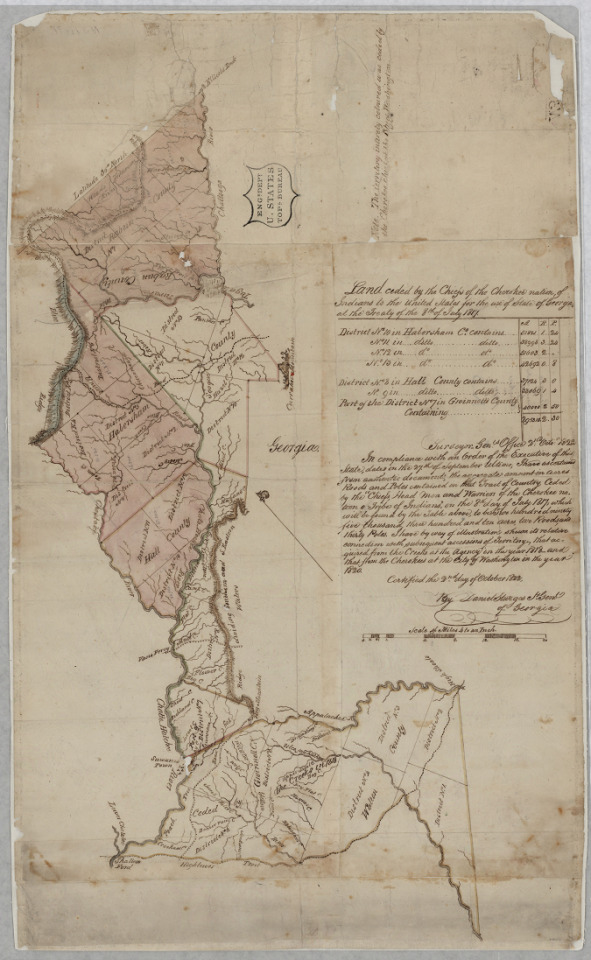
Map showing land ceded by the Cherokee and (Muscogee) Creek Nations to Georgia in 1817, 1818, and 1820, 10/2/1822.
File Unit: Georgia, 1784 - 1890
Series: Civil Works Map File, 1818 - 1947
Record Group 77: Records of the Office of the Chief of Engineers, 1789 - 1999
Image description: A map, tilted diagonally so that north points up. It shows the area of Georgia from, as far as I can tell, Gainesville to Clayton. Some of the map is shaded red and some is unshaded. The Blue Ridge mountains are blue.
Transcription:
[this is the same map as previously described.]
[sideways] Note: The territory intirety coloured was ceded by the Cherokee chiefs at the City of Washington [end sideways]
Land ceded by the Chiefs of the Cherokee nation of Indians to the United States for the use of the State of Georgia, at the Treaty of the 8th of July 1817.
[table contains name of district, then number of Acres, Roods, and Poles]
District No. 10 in Habersham Co. contains 51721 | 1 | 24
No 11. in ditto ditto 38998 | 3 | 24
No. 12 in do do 51603 | 2| "
No. 13 in do do 42692 | 0 | 8
District No. 8 in Hall County contains 37124 | 3 | 0
No. 9 in ditto ditto 33069 | 1 | 4
Part of the District No. 7 in Givinnette County Containing 40000 | 2 | 50
[double line indicating total]
295310 | 2 | 30
Surveyor Gen.ls Office 2nd Octo.r 1820
In compliance with an Order of the Executive of this State, dated on the 27th of September Ultimo; I have ascertained from authentic documents, the aggregate amount in Acres Roods and Poles contained in that Tract of Country Ceded by the "Chiefs, Head Men and Warriors of the Cherokee nation or Tribe or Indians," on the 8th day of July 1817, which will be found by the Table above, to be Two hundred ninety five thousand, three hundred and ten acres, two Roods, and thirty Poles. I have by way of illustration shown its relative connection with subsequent accessions of Territory, that acquired from the Creeks at the Agency in the year 1818 and that from the Cherokees at the City of Washington in the year 1820.
Certified the 2nd day of October 1822,
By Daniel Sturges Sv. Genl of Georgia
#archivesgov#October 2#1822#1800s#Native American history#American Indian history#Indigenous American history#Cherokee Nation#Muscogee Creek Nation#Georgia#land cessions#Indian Removal#Trail of Tears
50 notes
·
View notes
Text

#appalachia#appalachain mountains#smoky mountains#great smoky mountains#great smoky mountains national park#pete's branch falls#horse creek#cherokee national forest
5 notes
·
View notes
Text

Cherokee & Creek Indian War
2 notes
·
View notes
Text
Indian Removal Act Forces Indigenous Peoples to Migrate West
youtube
On May 28, 1830, President Andrew Jackson signed the Indian Removal Act, which authorized the president to grant land west of the Mississippi River in exchange for the lands of the American Indian tribes living primarily in the southeastern U.S. President Jackson’s message to Congress stated a double goal of the Indian Removal Act: freeing more land in southern states like Alabama and Mississippi, while also separating Native American people from “immediate contact with settlements of whites” in the hopes that they will one day “cast off their savage habits and become an interesting, civilized, and Christian community.”
Although the act referred specifically to those “tribes and nations of Indians as may choose to exchange the lands where they now reside” and President Jackson described the removal as a “happy consummation” of the government’s “benevolent policy” toward Indigenous people, the legislation led to the brutal forced migration of thousands of Muscogee (Creek), Choctaw, Chickasaw, Seminole, and Cherokee people to present-day Oklahoma. The journey came to be known as the “Trail of Tears.”
Numerous reports described epidemic illness, devastating exposure to the elements, and high rates of death along the migration paths. One eyewitness account published in the Arkansas Gazette stated, “No portion of American history can furnish a parallel of the misery and suffering at present endured by the emigrating Creeks.”
#Andrew Jackson#history#white history#us history#Indian Removal Act#Mississippi River#Alabama#Mississippi#indigenous#Muscogee#Creek#Choctaw#Chickasaw#Seminole#Cherokee#genocide#us genocide#christian#white supremacy#Youtube
0 notes
Text
0 notes
Text
https://x.com/VannMarilyn/status/1707533126702973306?t=Sj0McYkbpcg25tf6k9q08w&s=09

#Cherokee Nation#Freedmen#Black Freedmen#Marilyn Vann#Creek Nation#Muscogee#citizenship#tribal rights
1 note
·
View note
Text
American Auto Trail-Albert Pike Highway (Sallisaw to Warner OK)
American Auto Trail-Albert Pike Highway (Sallisaw to Warner OK)
https://youtu.be/KcQCI4wtWRI
This American auto trail explores the route of the 1920s Albert Pike Highway, from Sallisaw to Warner, Oklahoma.
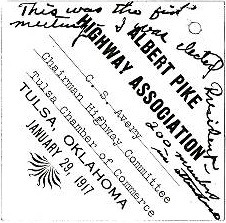
View On WordPress
#4K#Albert Pike#american history#Arkansas River#Auto trail#cherokee#Creek#Dwight Mission#Gore#highway#iron mountain#oklahoma#road travel#Sallisaw#slow travel#Southern Railway#st. louis#Vian#Warner#Webber Falls#YouTube
0 notes
Photo


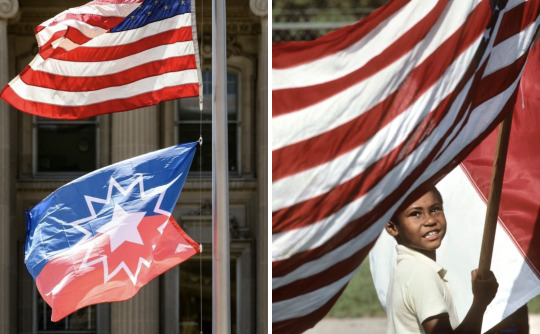


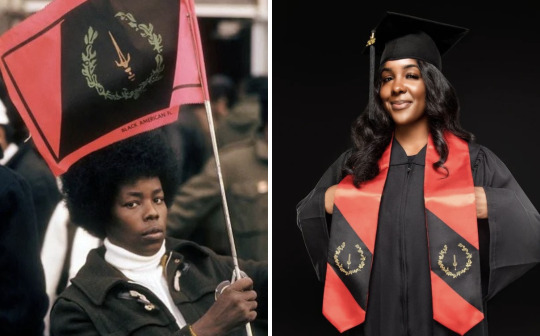
Juneteenth is a Black American holiday.
We call Juneteenth many things: Black Independence Day, Freedom Day, Emancipation Day, Jubilee Day. We celebrate and honor our ancestors.
December 31 is recognized as Watch Night or Freedom’s Eve in Black American churches because it marks the day our enslaved ancestors were awaiting news of their freedom going into 1863. On January 1, 1863, President Lincoln issued the Emancipation Proclamation. But all of the ancestors wouldn’t be freed until June 19, 1865 for those in Galveston, Texas and even January 23, 1866 for those in New Jersey (the last slave state). (It’s also worth noting that our people under the Choctaw and Chickasaw Nations wouldn’t be freed until April 28, 1866 and June 14, 1866 for those under the Cherokee Nation by way of the Treaties.)
Since 1866, Black Americans in Texas have been commemorating the emancipation of our people by way of reading the Emancipation Proclamation and coming together to have parades, free festivities, and later on pageants. Thereafter, it spread to select states as an annual day of commemoration of our people in our homeland.
Here’s a short silent video filmed during the 1925 Juneteenth celebration in Beaumont, Texas:
youtube
(It’s also worth noting that the Mascogos tribe in Coahuila, Mexico celebrate Juneteenth over there as well. Quick history lesson: A total of 305,326 Africans were shipped to the US to be enslaved alongside of American Indians who were already or would become enslaved as prisoners of war, as well as those who stayed behind refusing to leave and walk the Trail of Tears to Oklahoma. In the United States, you were either enslaved under the English territories, the Dutch, the French, the Spanish, or under the Nations of what would called the Five “Civilized” Native American Tribes: Cherokee, Creek (Muscogee), Chickasaw, Choctaw, and Seminoles. Mascogos descend from the Seminoles who escaped slavery during the Seminole Wars, or the Gullah Wars that lasted for more than 100 years if you will, and then settled at El Nacimiento in 1852.)
We largely wave our red, white and blue flags on Juneteenth. These are the only colors that represent Juneteenth. But sometimes you may see others wave our Black American Heritage flag (red, black, and gold).
Juneteenth is a day of respect. It has nothing to do with Africa, diversity, inclusion, immigration, your Pan-African flag, your cashapps, nor your commerce businesses. It is not a day of “what about” isms. It is not a day to tap into your inner colonizer and attempt to wipe out our existence. That is ethnocide and anti-Black American. If you can’t attend a Black American (centered) event that’s filled with education on the day, our music, our food and other centered activities because it’s not centered around yours…that is a you problem. Respect our day for what and whom it stands for in our homeland.
Juneteenth flag creator: “Boston Ben” Haith
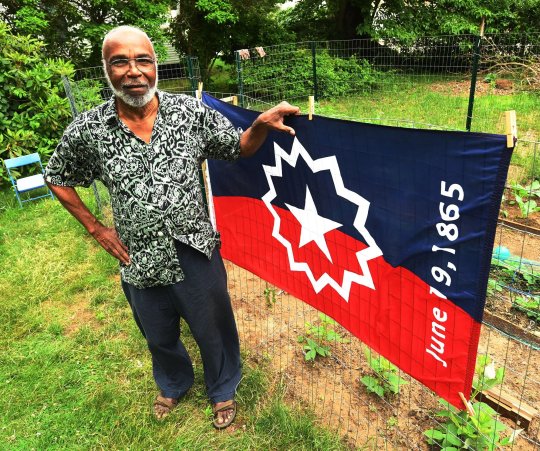
It was created in 1997. The red, white and blue colors represent the American flag. The five-point star represents the Lone State (Texas). The white burst around the star represents a nova, the beginning of a new star. The new beginning for Black Americans.
Black American Heritage Flag creators: Melvin Charles & Gleason T. Jackson

It was created in 1967, our Civil Rights era. The color black represents the ethnic pride for who we are. Red represents the blood shed for freedom, equality, justice and human dignity. Gold fig wreath represents intellect, prosperity, and peace. The sword represents the strength and authority exhibited by a Black culture that made many contributions to the world in mathematics, art, medicine, and physical science, heralding the contributions that Black Americans would make in these and other fields.
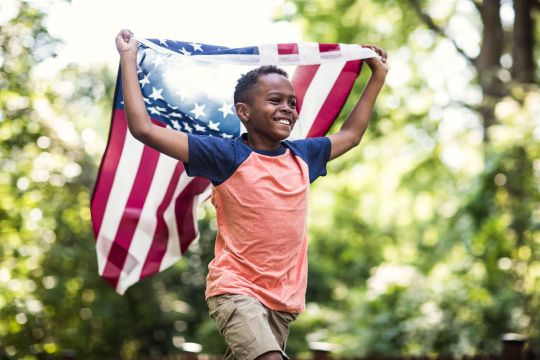
SN: While we’re talking about flags, I should note that Grace Wisher, a 13-year-old free Black girl from Baltimore helped stitched the Star Spangled flag, which would inspire the national anthem during her six years of service to Mary Pickersgill. I ain’t even gon hold you. I never looked too far into it, but she prob sewed that whole American flag her damn self. They love lying about history here until you start unearthing them old documents.
In conclusion, Juneteenth is a Black American holiday. Respect us and our ancestors.
#juneteenth#juneteenth flag#black american history#black american culture#ben haith#black american heritage flag#melvin charles#gleason t jackson#grace wisher#american flag#mascogos#juneteenth 2023
1K notes
·
View notes
Text
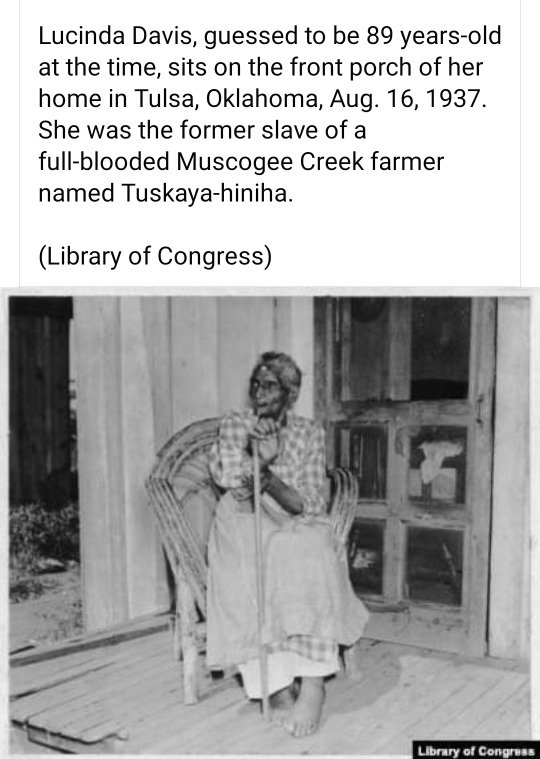
Lucinda Davis (c. 1848-after 1937) was a slave who grew up in the Creek Indian culture. She spoke the Muskogee Creek language fluently. The main information source was from an interview in the summer of 1937, at which time she was guessed to be 89 years old. Lucinda's parents were owned by two different Creek Indians. Being enslaved so young without her parents, she never found out her birthplace, nor the time of her birth. Her mother was born free in African when she escaped her captors either by running away or buying back her freedom, the white enslaver, who was also the mother's rapist and father of Lucinda, sold their child to Tuskaya-hiniha. Lucinda was brought up in The way the Creeks treated slaves was considered a much different and kinder form of slavery than the way the white Americans, Cherokee, or Choctaw went about it. Families could work under different slave owners and did not have to live on the same property as whom they worked for. The slaves worked quite hard and were paid, but had to give most of their pay to their owners, being allowed to keep a small amount. Lucinda was treated as a family member and did her duties. Her responsibility was taking care of the baby, amongst being an extra hand for cleaning and cooking here and there. She was not beaten or disrespected. It was understood what was needed of her, and she followed along.
#black history#native american tribes#native#black tumblr#black history month#oklahoma history#black literature#american slavery#african slavery#black community#civil rights#native history#lucinda davis#black history is american history#american history
461 notes
·
View notes
Text
Shoutout to all Native American LGBTQ+ folks.
It should be well noted hundreds of thousands of Native American tribes exist, much more long lost to time. This post includes the most populated as of now, but know this applies to all.
Also some of these tribes cross over to Mexico and Canada!
Shoutout to all Cherokee LGBTQ+ folks.
Shoutout to all Navajo LGBTQ+ folks.
Shoutout to all Sioux LGBTQ+ folks.
Shoutout to all Chippewa LGBTQ+ folks.
Shoutout to all Apache LGBTQ+ folks.
Shoutout to all Shawnee LGBTQ+ folks.
Shoutout to all Choctaw LGBTQ+ folks.
Shoutout to all Pueblo LGBTQ+ folks.
Shoutout to all Mohawk LGBTQ+ folks.
Shoutout to all Blackfeet LGBTQ+ folks.
Shoutout to all Creek (Muscogee) LGBTQ+ folks.
Shoutout to all Seminole LGBTQ+ folks.
Shoutout to all Inupiat LGBTQ+ folks.
Shoutout to all Lumbee LGBTQ+ folks.
Shoutout to all Cayuga LGBTQ+ folks.
Shoutout to all Onondaga LGBTQ+ folks.
Shoutout to all Seneca LGBTQ+ folks.
Shoutout to all Tuscarora LGBTQ+ folks.
Shoutout to all Chitimacha LGBTQ+ folks.
Shoutout to all Shoshone LGBTQ+ folks.
Shoutout to all Nez Perce LGBTQ+ folks.
Shoutout to all Yakama LGBTQ+ folks.
Shoutout to all Klickitat LGBTQ+ folks.
Shoutout to all Palouse LGBTQ+ folks.
Shoutout to all Wasco–Wishram LGBTQ+ folks.
Shoutout to all Spokan(e) LGBTQ+ folks.
Shoutout to all Arapaho LGBTQ+ folks.
Shoutout to all Cheyenne LGBTQ+ folks.
Shoutout to all Caddo LGBTQ+ folks.
Shoutout to all Powhatan LGBTQ+ folks.
Shoutout to all Waco LGBTQ+ folks.
Shoutout to all Tawakoni LGBTQ+ folks.
Shoutout to all Quapaw LGBTQ+ folks.
Shoutout to all Aleuts LGBTQ+ folks.
Shoutout to all Comanche LGBTQ+ folks.
Shoutout to all Chugach LGBTQ+ folks.
Shoutout to all Assiniboine LGBTQ+ folks.
Shoutout to all Gros Ventre LGBTQ+ folks.
Shoutout to all Kiowa LGBTQ+ folks.
Shoutout to all Lakota LGBTQ+ folks.
Shoutout to all Lipan Apache LGBTQ+ folks.
Shoutout to all Plains Apache LGBTQ+ folks.
Shoutout to all Odawa LGBTQ+ folks.
Shoutout to all Ojibwe LGBTQ+ folks.
Shoutout to all Potawatomi LGBTQ+ folks.
Shoutout to all Hualapai LGBTQ+ folks.
Shoutout to all Ute LGBTQ+ folks.
Shoutout to all Pawnee LGBTQ+ folks.
Shoutout to all Wichita LGBTQ+ folks.
Shoutout to all Mandan LGBTQ+ folks.
Shoutout to all Osage LGBTQ+ folks.
Shoutout to all Yup'ik LGBTQ+ folks.
Shoutout to all Omaha LGBTQ+ folks.
Shoutout to all Ponca LGBTQ+ folks.
Shoutout to all Tlingit LGBTQ+ folks.
Shoutout to all Taku LGBTQ+ folks.
Shoutout to all Chinookan LGBTQ+ folks.
Shoutout to all Hopi LGBTQ+ folks.
Shoutout to all Zuni LGBTQ+ folks.
Shoutout to all Crow LGBTQ+ folks.
Take pride in it all. Your culture, your identity, it’s all so beautiful. Celebrate where you are from and who you are. It makes you you, and that is something to be proud of.
Post for Africans, post for Oceanic folks, post for Middle Easterners, post for Latin Americans/Hispanics, post for Pacific Islanders, post for Asians, post for Caribbeans
#lgbt#indigenous#native american#mental health#positivity#self care#mental illness#self help#recovery#lgbtq#lgbtqia#lesbian#wlw#sapphic#bi#bisexual#gay#trans#transgender#pansexual#asexual#aromantic#aroace#intersex#lgbtq representation#lgbt positivity#lgbtq positivity#pride#lgbtq community#lgbt pride
68 notes
·
View notes